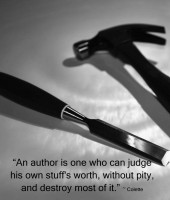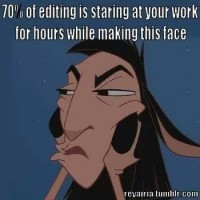Revision & Editing
I haven’t posted in a little while, partly because I’ve been knee-deep in edits for my new novel. I also taught a Sharpening the Quill Writing Workshop on this very subject and thought I’d share a little of it here with you. Editing makes all the difference in your life as a writer. You have to be able to edit your own work, and you have to be open to editing by someone you respect, be it an agent, a in-house editor from a publishing house, a free-lance editor or your first reader (mine is My Best Beloved, who has learned how to be gentle! Snort.)
Editing takes a different part of the brain. To write your first draft, you banished the internal critic. Now, when you’re getting your story ready for submission, make the critic welcome.
I know how much courage it takes to expose your work to critique — your own or that of other people. I know how hard it can be to hear criticism. Such comments can be discouraging, but remember that your goal is to improve your writing. While it’s true not all criticism is worthwhile, if you respect your editor/first-reader, it’s wise to listen to her misgivings, even if you don’t listen to her solutions. The solutions to problems, in my experience, are generally best if they come from the author, but the knowledge that a dedicated reader has discovered something that doesn’t work for them is invaluable and shouldn’t be ignored.
Here is what Canadian writer Pierre Berton had to say on the subject:
“. . . I want people to hurt my feelings. I want to be told honestly by somebody I trust that this piece of writing is a bunch of crap. You know, when I finish a manuscript, I think, ‘wow, this is probably the best thing I’ve ever done in my life, this is a great work of art. Boy, wait till the critics see this! They’ll carry me through the streets on their shoulders. I’ve never done as well as this, and I think, I won’t even both to show it to Janice [Berton’s freelance editor]. She doesn’t need to see it. But I think well, maybe I will, as a courtesy.’ Back comes 70 typed pages telling me what’s wrong with it and what I have to do which means really I have to rewrite great chunks of it, but then rewriting is the name of the game. Rewrite. Rewrite. Rewrite. The amateurs don’t understand that you rewrite some things more than once. Peter Newman writes his books about 12 times. I write four or five full drafts. By that I mean I put them right to the typewriter, which I use instead of the computer, and then I rewrite certain paragraphs 13 or 20 times over and over again . . .”
– Pierre Berton, The Joy of Writing, Kesterton Lecture, School of Journalism and Communication, Carleton University, Ottawa; March 18, 2003
Revision is work. But the you may find you can concentrate on the work for far longer than you could when toiling away at a first draft.
Writing a first draft, Janet Burroway says, is “very like tennis or softball – I have to be psyched for it, energy level up, alert, on my toes. A few hours is all I can manage, and at the end of it I’m wiped out. Revision is like careful carpentry, and if I’m under a deadline or just determined to get this thing crafted and polished, I can be good for twelve hours of it.”
When reading over that first draft, let your misgivings surface. Don’t be afraid of them. They will teach you. Robert Olen Butler suggests we read over our work, with an ear out for the Twang! You know, that sentence/phrase/paragraph/word/scene that just doesn’t ring true. Make a mark next to the passage. Go back and figure out what the problem is, and revise or delete, but for God’s sake, don’t ignore it.
So, what have you got? What are your misgivings for the piece you’re working on?


Great post, Lauren. I try to remember all of this, and I try to pass it on to my writing students. As Berton put it, “Rewrite. Rewrite. Rewrite.”
I also like the advice of reading your writing out loud so you *hear* the mistakes your eye misses.
Good luck with your edits and revisions.
Thanks, Christine. It’s so true, isn’t it — we can recognize our mistakes so much easier when we hear the prose out loud!
Would it be okay if I shared this with my writing students, Lauren?
by all means, Christie. Share away!